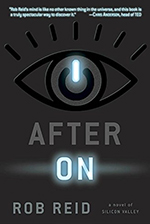 It turns out that Rob Reid can write. This “novel of Silicon Valley” is a tour de force of writing. Reid shows off his chops at writing potboiler adventure stories, ironic Amazon reviews, and sparkling dialogue. It’s a story of Silicon Valley culture, of start-ups and venture capital and social navigation in the Bay Area, but it’s also a novel that explores artificial intelligence (AI) in a fun, engaging way. Much of the material covered in Life 3.0 or Our Final Invention is explored here in an approachable, character-driven fashion (James Barrat even gets a shout-out by name!). The decisive strategic advantage (see Bostrom’s Superintelligence for more details) that the world’s first AI gets is an interesting plot point to the story, as the world’s first AI is more interested in matchmaking (which she is astonishingly good at, considering she has access to all the world’s data). The book explores quantum computing, augmented reality, the casual erosion of privacy, self-commodification of services, bioterrorism, genetic engineering, the ethics of publishing sensitive data, generation of fake audio and video, government surveillance, and much more. The setting is today – and it very much feels like a novel of this moment in history. It won’t feel as fresh ten years down the line, because all the references and plot devices hinge on the tools in our pockets right now, the capabilities of our computers right now, and I guess also the things our computers cannot yet do – but will be able to pretty soon. So read it soon! The characters are brash, brilliant, and often stressed out. They act like us, having the conversations we’re having. The difference is that as they’re innovating and grappling with office politics, an AI emerges from the Facebook/Groupon/Google/Tinder/Apple-like company that they work for. The whole set-up is simultaneously a commentary on modern American techno-life and an adventure story. It was very enjoyable. I listened to the audio-book version, which was lively and exceptionally well produced. If you can’t stomach a nonfiction book about AI, you may find After On more palatable. I was very impressed with the book overall; I know I’m going to read more by Rob Reid in the future.
It turns out that Rob Reid can write. This “novel of Silicon Valley” is a tour de force of writing. Reid shows off his chops at writing potboiler adventure stories, ironic Amazon reviews, and sparkling dialogue. It’s a story of Silicon Valley culture, of start-ups and venture capital and social navigation in the Bay Area, but it’s also a novel that explores artificial intelligence (AI) in a fun, engaging way. Much of the material covered in Life 3.0 or Our Final Invention is explored here in an approachable, character-driven fashion (James Barrat even gets a shout-out by name!). The decisive strategic advantage (see Bostrom’s Superintelligence for more details) that the world’s first AI gets is an interesting plot point to the story, as the world’s first AI is more interested in matchmaking (which she is astonishingly good at, considering she has access to all the world’s data). The book explores quantum computing, augmented reality, the casual erosion of privacy, self-commodification of services, bioterrorism, genetic engineering, the ethics of publishing sensitive data, generation of fake audio and video, government surveillance, and much more. The setting is today – and it very much feels like a novel of this moment in history. It won’t feel as fresh ten years down the line, because all the references and plot devices hinge on the tools in our pockets right now, the capabilities of our computers right now, and I guess also the things our computers cannot yet do – but will be able to pretty soon. So read it soon! The characters are brash, brilliant, and often stressed out. They act like us, having the conversations we’re having. The difference is that as they’re innovating and grappling with office politics, an AI emerges from the Facebook/Groupon/Google/Tinder/Apple-like company that they work for. The whole set-up is simultaneously a commentary on modern American techno-life and an adventure story. It was very enjoyable. I listened to the audio-book version, which was lively and exceptionally well produced. If you can’t stomach a nonfiction book about AI, you may find After On more palatable. I was very impressed with the book overall; I know I’m going to read more by Rob Reid in the future.

